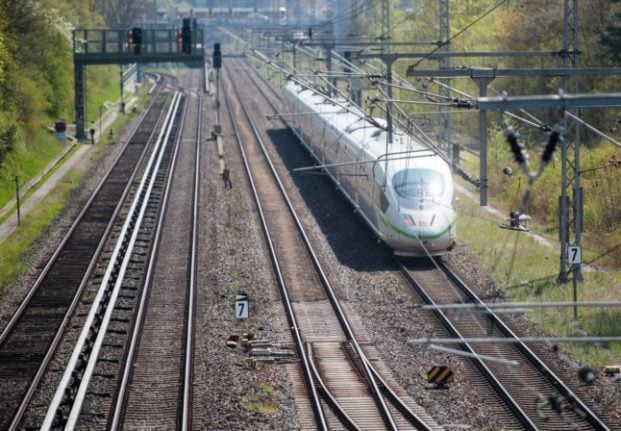2017 will clearly be a year to remember when it comes to developments on the Swedish data center and tech scene. Not least for being the year Amazon Web Services decided to set up shop in Sweden and Google acquired the largest plot of land in Avesta as a potential data center location.
This of course begs the question: what’s in store for 2018?
For answers, we pulled together our network of data center and tech sector experts. Here’s what they had to say:

Mark Thiele, CIO/CSO
Apcera
AI and machine learning combine with IoT to create hundreds of new solutions.
The acceleration of growth in cloud and online services, combined with trends like blockchain, AR, IoT, AI, and machine learning will mean huge data center demand in 2018. In addition, 5G wireless and other supporting technologies will really begin to demonstrate significant and new business model opportunities, especially at the edge.
Pay attention to this in 2018: The entire IT market will nearly double by 2022 so we can expect to see a threefold-growth of cloud and the associated data center footprint globally by then.
 Darren Mowry, Managing Director, Business Development
Darren Mowry, Managing Director, Business Development
Amazon Web Services EMEA
Sweden as 'Cloud Nation'
The pace of digital transformation within large enterprises will increase, meaning we'll start seeing mass migrations to the cloud. Sweden is well-prepared, but needs to continue to innovate and take a leading role within the EU as a tech-savvy role model. Sweden should grab the opportunity to transform itself into a 'Cloud Nation' — where cloud adoption is easy and supported by a cloud-friendly framework backed by the government.
Pay attention to this in 2018: 2018 will be the year machine learning and AI breakthrough in all kinds of industries, and the cloud will be the catalyst for this breakthrough.

Hélène Barnekow, CEO
Telia Sweden
Edge computing.
The announcement that AWS will build three new data centers in Sweden, just a few months after Telia opened Backbone North, means we’ll see even more data center investment in Sweden during 2018. I also believe 2018 will be a year of more intense VR/AR application development. And I think people will be talking a lot about edge computing in 2018 as an increase in the number of demanding applications requires storage much closer to the user to ensure an optimal user experience.
.jpg)
Magnus Melander, Evangelist
THINGS Stockholm
Hardware is back!
Swedish manufacturing will strike back in 2018 and take the lead in digital transformation and smart sustainable factories by mastering collaboration with startups and going from POCs to deployment. The perception that Sweden is a great place for IoT-enabled digital transformation will attract more foreign companies and investors.
Pay attention to this in 2018: The UN's Responsible Consumption and Production goal calls for immediate action from all of us, both individually and collectively.

Joachim Karthauser, CTO
Climeon AB
E-mobility.
Finding the lowest possible carbon footprint and best environmental performance for data centers will be key selection criteria in 2018 and beyond, as energy demands for internet use starts to exceed the energy demand of air traffic. We can expect to hear more about e-mobility in 2018 too. And the transport sector has to change – so we will see an exponential increase in electric cars that will require building new infrastructure.
Pay attention to this in 2018: People will follow the increase of CO2 in the atmosphere and demand political action, such as more support for renewable energy.
READ MORE: Capturing the data center opportunity
 Fredrik Lind, Senior Partner & Managing Director
Fredrik Lind, Senior Partner & Managing Director
Boston Consulting Group
Ethics and sustainability. The world needs more and tech is no exception.
2018 should be the year when we establish digital infrastructure as a core priority for Sweden. Swedish tech will move the global digital needle much further next year, with a number of new companies entering the global multinational tech elite, joining forces with established Swedish success stories like Spotify, Klarna, and King. Also, AI use cases, blockchain enabled technologies, IoT applications, and AR will be mainstream by the end of 2018, becoming natural components in our daily lives.
Pay attention to this in 2018: E-Intensity and e-GDP for nations; specifically China, Singapore, and Taiwan, are overtaking Europe in both absolute and relative terms when it comes to the digitization of their economies.

Anne Graf, CEO
Hydro66
Blockchain infrastructure.
Decentralised technologies such as blockchain will be game changers for financial markets, the supply chain, healthcare, the regulatory environment, and many other areas. There is no doubt 2018 will see a huge amount of hype, news, and actual innovation in the blockchain space. Thus, in 2018 we’ll need to grapple further with how to host blockchain infrastructure in a way that makes economic and environmental sense.
Pay attention to this in 2018: In 2017, the total market cap of cryptocurrencies grew from $17.7 billion to $413 billion, so there will be a lot of blockchain hype in 2018, which means we'll need a sustainable approach to hosting blockchain infrastructure.
READ MORE: Mining the future: Why Sweden is leading the cryptocurrency revolution
.jpg)
Mattias Fridström, VP & Chief Evangelist
Telia Carrier
New e-commerce giants like AWS will fuel local markets and make them more important.
The establishment of Amazon in Sweden is going to be the biggest development in the country in 2018. I believe it will cause the market for putting applications or storage on the cloud to really take off. We’ll also start seeing 5G installations in Sweden in 2018, and Sweden will serve as an important testing ground to see what might be useful moving forward.
Pay attention to this in 2018: They say the internet “weighs 50 grams”. But it is increasing in importance. In 2018 the internet will move at an even faster pace from Business Critical to Life Critical.
Looking for a place to store your data? Start your site exploration here

Mattias Ganslandt, CEO & President
Multigrid Data Centers
Cloud first!
In 2018, we will see the rise of hyperscale cloud computing in Sweden based on globally competitive and sustainable energy solutions. Technical innovations and new business models should result in “creative destruction” and the expansion of exports based on various IT-as-a-Service offerings produced in a new breed of extremely productive facilities.
Pay attention to this in 2018: In the next three years wind power generation in Sweden is predicted to increase by 5 TWh (or 5 billion kWh). That means enough renewable energy to run 3 million cloud servers at full load for a year.

Patrik Öhlund, CEO
Node Pole
Data Center as a Service (DCaaS).
I expect blockchain to become more mature in 2018, which will lead to a broader array of industrial applications based on the technology. The global growth in robotics, AI, deep learning, etc., will also increase global demand for high-performance computing (HPC) capacity. And expect to hear more about “DataCenter as a Service (DCaaS)” — as IT becomes more strategically important, the focus on data centers will shift from providing infrastructure to providing on-demand functions and services.
Pay attention to this in 2018: The Internet of Things consumer product market is predicted to grow by 34 percent in 2018. That is likely to be adjusted upwards…

Tor Björn Minde, CEO
RISE SICS North AB
Machine learning.
I expect the Open Compute Project (OCP) to take center stage in 2018. It’s going to start affecting servers used in both data center co-location and other enterprises. I also think the roll out of Ericsson’s 5G will trigger more developments in Sweden when it comes to edge data centers.
Pay attention to this in 2018: We'll create 180 zettabytes – or 180 trillion gigabytes – of data in 2025, up from just 10 zettabytes in 2015.
READ MORE: Discover Data Centers by Sweden

Johan Börje, Head of Marketing
Stockholm Data Parks
Clean power.
In 2018, three trends will drive an explosion of data center establishments in Sweden: the unprecedented growth of blockchain applications; Sweden will become the industry norm following the establishment of AWS; and third, mounting pressure to improve the environmental profile of data centers will drive general data processing to Sweden to benefit from low CO2 footprint and heat recovery.
Pay attention to this in 2018: IEA presents a scenario where worldwide renewable capacity will increase by nearly 90 percent between 2017 and 2022.
 Linus Axelsson, Marketing Manager
Linus Axelsson, Marketing Manager
IP-Only
Internet of Things (IoT).
IT and digitalisation must be the core of every company's business strategy. Collecting and using data, working agile and efficiently, communicating internally and externally through IT systems and online will be necessary from now on. To succeed with this, it all comes down to having the right IT infrastructure and environment to keep up with the digital revolution.
 Tomas Sokolnicki, Head of Data Centers by Sweden
Tomas Sokolnicki, Head of Data Centers by Sweden
Business Sweden
Edgeification.
Previously, new segments typically emerged one by one. We are now at the cusp of massive data growth, driven by simultaneous explosions of data from the cloud, AI, streaming, VR/AR, IoT, connected cars, and sensors. From big data to huge data! We'll also see the systematic roll-out of edge computing on a scale never before attempted and driven by e-mobility.
Pay attention to this in 2018: Will Apple or Amazon become the first $1 trillion company? Technology companies dominate in terms of market cap, and China is now second only to the US in terms of market cap of Top 100 companies.
This article was produced by The Local Client Studio and sponsored by Data Centers by Sweden.



 Please whitelist us to continue reading.
Please whitelist us to continue reading.